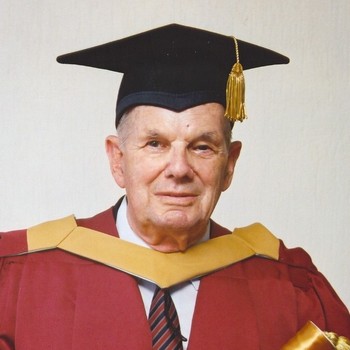DOCTOR OF TECHNOLOGY (HONORIS CAUSA)
 Roderick John Ironside was born in Perth, Scotland in 1919, where he received his schooling. He started his career in Scotland and completed an apprenticeship in motor engineering at the Inverness Technical College obtaining the Diploma of the Scottish Motor Trade Association. He went on to study at the Royal Air Force College of Engineering in England, graduating in mechanical engineering. During the Second World War, he served with distinction with the Engineering Branch of the Royal Air Force in France and the Middle East.
Roderick John Ironside was born in Perth, Scotland in 1919, where he received his schooling. He started his career in Scotland and completed an apprenticeship in motor engineering at the Inverness Technical College obtaining the Diploma of the Scottish Motor Trade Association. He went on to study at the Royal Air Force College of Engineering in England, graduating in mechanical engineering. During the Second World War, he served with distinction with the Engineering Branch of the Royal Air Force in France and the Middle East.
He arrived in Cape Town in 1947 and soon after that took the train to Johannesburg, where he found a job with the Johannesburg Municipal Transport depot. In the following year, he joined the Pretoria Technical College as a lecturer in Automotive Engineering. During this period he was involved in establishing a training facility for upgrading senior Non-Commissioned Officers who had been promoted in the field without the benefit of technical upgrading. He also created a facility to train apprentices for the Transvaal Motor Traders Association.
In 1953 he moved to the Eastern Cape where he joined General Motors SA, serving in various positions within the company until his retirement in 1985 as Deputy Managing Director.
Whilst at General Motors, as Director of Personnel & Industrial Relations, he was responsible for a programme which involved the social upliftment of the workforce through creating a scheme for the financing of employee housing, establishing sport facilities in the deprived communities and facilitating the opportunity for GM graduates of the Port Elizabeth College for Advanced Technical Education (the predecessor to the Technikon) to proceed further in their studies at the General Motors Institute in Michigan.
During this time, American politicians were starting to ask questions about the situation in South Africa and it was around this period that Mr Ironside was instrumental in having the GM cafeteria and change room facilities integrated, which was in contravention of SA legislation at the time, albeit with the tacit approval of the government of the day. He was also in discussions with Prof Nic Wiehahn, of the Wiehahn Commission, to improve South African labour legislation.
In 1984 as Deputy Managing Director, he played a major role in addressing the socio-political and economic issues of the day and was a leader in the transformation of General Motors SA and on the wider South African scene.
Throughout his stay in Port Elizabeth, he served the local community in various capacities on numerous boards and committees as well as on a number of national boards and organisations.
Mr Ironside actively participated in the governance of the PE Technikon through the Council and Executive Committee of Council as a member (1981 – 1995) and as chair (1985 – 1995) as well as a member and chair of the Board of Trustees. During his time as chair of Council, he guided the PE Technikon through a period of rapid transformation and growth that served as a shining example to all historically advantaged institutions of higher education in South Africa. As early as 1987, he convinced Council to abolish racial quotas for admission and in 1989 strongly supported the Rectorate in providing access to Technikon residences for students from all racial backgrounds. In spite of strong resistance from the government of the day, he stood firm in defending his and the Technikon’s actions and succeeded in a peaceful transformation that was accepted by all. In his final years of office, he implemented the measures to constitute the Technikon’s new democratic governance structures.
The Council and Senate of the PE Technikon recognises his outstanding guidance in the transformation process and is honoured to confer the degree, DOCTOR TECHNOLOGIAE (HONORIS CAUSA) on RODERICK JOHN IRONSIDE.